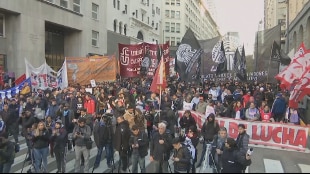- Argentina, defeat Macri. Dollar + 34% and stock market down 31%
Share
September 13, 2019 Argentina is in crisis. And now the country is seriously at risk of a food emergency. The lower house of parliament approved with a 222 votes in favor and none against a bill to strengthen the interventions to protect the most vulnerable categories. The text provides for a 50% increase in funds allocated to nutrition programs already next year. If the vote goes to the Senate the food emergency will remain in force until 2022.Last Wednesday 11 September thousands of protesters, together with the unions, occupied the main street of the capital Buenos Aires (9 July, in the name of 1816 independence) asking for a food emergency with a poverty rate that is reaching 30 %. In August inflation, compared to July, grew by 4%. The Argentine peso is experiencing a major devaluation based on the dollar after the primary elections a month ago, where president Mauricio Macri suffered a bad defeat, leaving room for Alberto Fernández who proposed vice president Cristina Kirchner, former president of the country since 2007 to 2015.
Country at risk of bankruptcy
In 2015 Macri had won by promising that it would revolutionize the politics of his country and restart the economy by opening up to international markets, but this is not happening. The biggest impact of inflation is affecting mainly food and medical goods. Argentina is experiencing an economic retraction with large losses in industrial production (-10.6% in the first four months) and in the labor market, where the unemployment rate has exceeded the 10% threshold.
The Argentine government has also imposed a series of checks on the movement of capital to try to keep inflation under control, which has reached 54%, and avoid a new bankruptcy of the country, hit hard between 1999 and 2002. Essentially , Argentines will no longer be able to freely change the national currency into foreign currency while limits have been imposed on the possibility of transferring funds outside the country.
As if that were not enough, after the very heavy financial repercussions, in August the Economy Minister, Nicolas Dujovne, announced his resignation, making room for Hernan Lacunza.
The continuous deterioration has prompted the Buenos Aires government to ask the International Monetary Fund to start negotiations to reschedule and move the credit repayment deadlines: last year, the Argentine government had obtained a loan from the IMF to support the economy of the country amounting to 57.1 billion dollars and should return it between 2022 and 2023.
At the end of 2018 the debt was equal to 86% of GDP, but the huge problem is that most of the Argentine debt (around 80%) is in dollars. The constantly changing weight collapse therefore makes it very costly to repay it. All this in an electoral campaign context, with the October 27 presidential election vote approaching.

